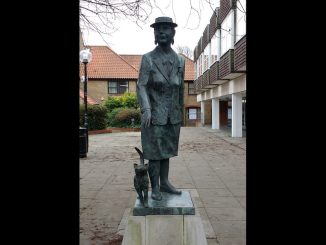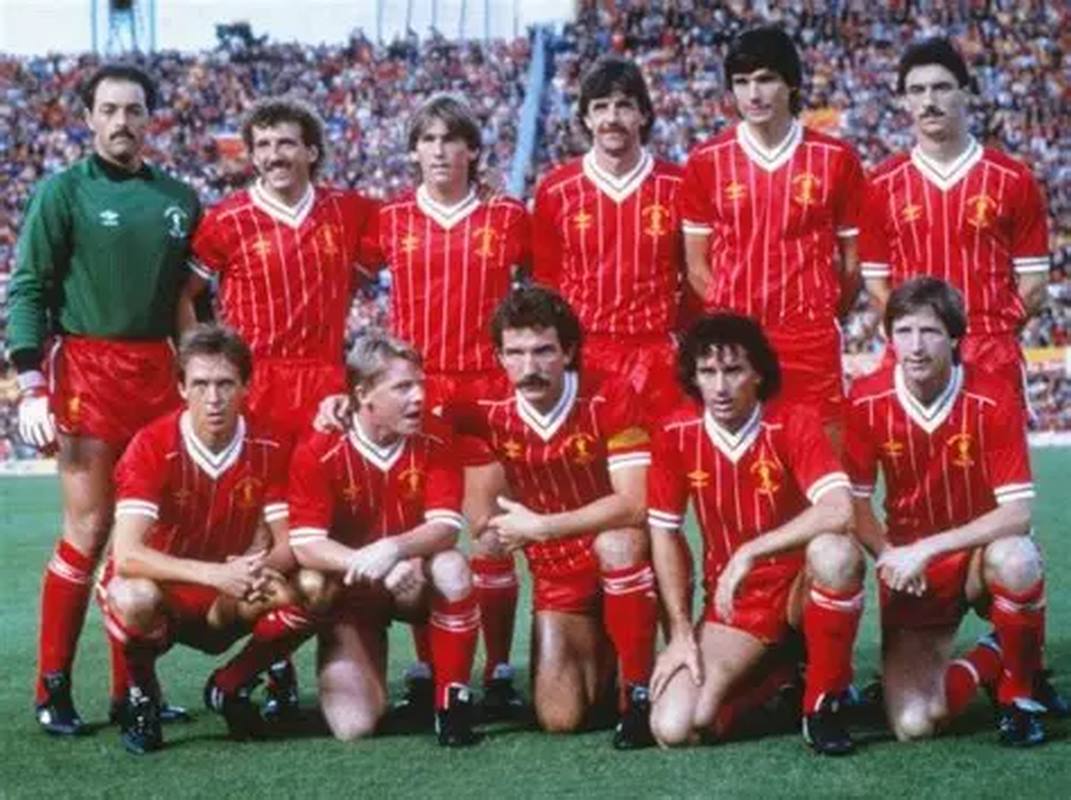69 years ago today, Alan Hansen, one of the greatest Scottish footballers of all time and one of the greatest defenders to ever play in England, was born. Transforming the role of the central defender with his delicate touch and incisive passing, he won 8 top-flight English titles with Liverpool FC, including a period that saw three in a row between 1981 and 1984, during which they also won the club’s first-ever English League Cup, as well as its first three European Cups. READ more about this legendary player… (1955)

At the tail-end of the club’s most storied period, a 30-year-old Hansen was given the club captaincy by player-manager Kenny Dalglish. As captain of Liverpool, Hansen lifted the League Cup, FA Cup, and claimed another league title in 1986-87.
After retiring, Hansen embarked on a 22-year career as co-host of BBC’s Match of the Day, the oldest-running football punditry show in the UK in which he frequently criticized players for their “diabolical,” defending, while simultaneously highlighting the “art” when players defended correctly. Just 4 days ahead of his 69th Birthday, Hansen was rushed to the hospital after falling seriously ill with an undisclosed illness.
MORE Good News on this Day:
- Rhode Island, whose flag features the word “HOPE”, became the first of Britain’s North American colonies to ban the importation of slaves (1774)
- France came to the aid of the American Revolution when Marquis de Lafayette landed near Charleston, S.C., to help train the army of the Continental Congress (1777)
- U.S. President Lyndon Johnson nominated Thurgood Marshall (the highly successful attorney known for his victory in Brown v. Board of Education—a 1954 decision that ruled segregated public schools were unconstitutional) to the highest court, and he became the first black Supreme Court Justice (1967)
- British singer-songwriter, David Gray, whose White Ladder LP and single, Babylon climbed the charts, was born (1968)
- The No.1 album Frampton Comes Alive! was recorded by Peter Frampton at the Winterland Ballroom in San Francisco, which stayed on the charts for 97 weeks (1975)
- South Korean President Kim Dae-jung met Kim Jong-il, president of North Korea, for the first time, fulfilling the latter’s Sunshine Policy with an inter-Korea summit (2000)
- The Arctic Monkeys played live for the first time at The Grapes pub in Sheffield, England, and were paid £27 from ticket sales (2003)
53 years ago today, the New York Times began publication of the Pentagon Papers, released by RAND Corp staffer Daniel Ellsberg. They revealed to the American public the true scope of US operations in the Vietnam War, the bombing of Cambodia and Laos, and the despicable depth of dishonesty that four separate presidential administrations went to in order to prevent the criminality of the war from being known to the public and the UN.

The New York Times began publishing excerpts on June 13, 1971; the first article in the series was titled Vietnam Archive: Pentagon Study Traces Three Decades of Growing US Involvement. The study was dubbed The Pentagon Papers during the resulting media publicity. Street protests, political controversy, and lawsuits followed.
“I felt that as an American citizen, as a responsible citizen, I could no longer cooperate in concealing this information from the American public,” Ellsberg said after being detained. “I did this clearly at my own jeopardy and I am prepared to answer to all the consequences of this decision.”
The Pentagon Papers revealed that the United States had expanded its war with the bombing of Cambodia and Laos, coastal raids on North Vietnam, and Marine Corps attacks, none of which had been reported by the American media. The most damaging revelations in the papers revealed that four administrations (Truman, Eisenhower, Kennedy, and Johnson) had misled the public regarding their intentions.
In another example, a memo from the Defense Department under the Johnson Administration listed the reasons for American persistence: (1971)
70% – To avoid a humiliating U.S. defeat (to our reputation as a guarantor).
20% – To keep [South Vietnam] (and the adjacent) territory from Chinese hands.
10% – To permit the people [of South Vietnam] to enjoy a better, freer way of life.
ALSO – To emerge from the crisis without unacceptable taint from methods used.
134 years ago today, Dorothy Sayers, the renowned English detective novelist was born. She is best known for her mysteries, a series of novels and short stories set between the First and Second World Wars that feature English aristocrat and amateur sleuth Lord Peter Wimsey, which remain popular to this day. Her man Wimsey made her a solid part of a literary movement known as the “Golden Age of Detective Fiction”, and her stories explored the trauma of World War I veterans in The Unpleasantness at the Bellona Club, discussed the ethics of advertising in Murder Must Advertise, and advocated women’s education (then a controversial subject) and role in society in Gaudy Night.

Despite making it into the public conscience with her books and social commentary (Sayer was a kind of proto-feminist) the work she is most proud of is her translation of Comedia Divina, or what we call Dante’s Inferno. She rejected an anglicizing of the language in favor of preserving Alighieri’s “three rhyme” forms, and for that her translation, despite several updated editions released by other authors, is still being published today.
An example is one of those lines that transcends the book: “Abandon hope all ye who enter here.” This is not true of the rhyming structure in that passage. Instead, Sayer wrote it as “Lay down all hope, you who go in by me,” so that her “go in by me” rhymes with “made to be” two lines earlier, and “unsearchably” two lines before that. (1893)
Happy Birthday to Captain America, Chris Evans, who turns 43 today. Best known for playing that much-loved superhero in Marvel movies, the role established him as one of the world’s highest-paid actors.

Evans also starred in the 2019 mystery film Knives Out, and the television miniseries Defending Jacob in 2020. He made his directorial debut in 2014 with the romantic drama Before We Go, which he also produced and starred in. His Broadway debut in the 2018 revival of Lobby Hero earned him a Drama League Award nomination.
In the last years, he’s been quietly visiting the U.S. Capitol persuading politicians to put aside partisanship and explain, in under two minutes, their views on policy to young Gen Z voters. To date, they’ve gotten over 200 short interviews and mini-debates which are posted to the website and app A Starting Point, which Evans co-founded with Mark Kassen and Joe Kiani. WATCH him in the halls of Congress and hear about his rescue dog, Dodger… (1981)
And on this day in 1966, Americans were given their “Miranda rights” by the U.S. Supreme Court.

The judges ruled 5–4 in Miranda v. Arizona that the police must inform suspects of their rights before questioning them. Defendants must be informed of the right to consult with an attorney before and during questioning and of the right against self-incrimination, otherwise evidence gained will not be admissible in court. Afterward, this Miranda warning became routine police procedure: “You have the right to remain silent. Anything you say can and will be used against you in a court of law. You have the right to an attorney. If you cannot afford an attorney, one will be provided for you.”
Also, on this day in 1865, the Irish poet William Butler Yeats, one of the foremost figures of 20th-century literature, was born. A driving force behind the Irish Literary Revival, Yeats also served as a two-term Irish Senator. He won the Nobel Prize in Literature for his “inspired poetry that gives expression to the spirit of a whole nation.”
Also, Happy Birthday to Tim Allen, who turns 71 today.

The actor and comedian best loved by families as the voice of Buzz Lightyear on Toy Story also played St. Nick in The Santa Clause trilogy. Tim ‘The Toolman’ Taylor of TV’s Home Improvement fame also stars in the popular television show Last Man Standing. (1953)
And, 54 years ago today, The Long and Winding Road became the 20th—and final—No. 1 single in the US by The Beatles.

Paul McCartney wrote the heart-filled song at his farm in Scotland. The idea was inspired by the sight of a road “stretching up into the hills” in the remote Highlands surrounded by lochs and distant mountains.
Inspired by the growing tension among The Beatles, the song set the all-time record for number of chart-topping singles on the Billboard Hot 100. And, amazingly, the Fab Four achieved this feat within the 74 months following their debut 1964 hit, I Want to Hold Your Hand—an average of one chart-topping single every 3.7 months, another all-time record. (1970)
And, on this day in 1989, the 16th James Bond film, License to Kill, premiered.

Starring Timothy Dalton in the role of the fictional spy, it is the first one not to use the title of an actual Ian Fleming story, though the script has elements of two of the author’s short stories and a novel. The film portrays Bond being suspended from his job at MI6 as he pursues the drug lord who ordered an attack against his CIA friend Felix Leiter and his wife during their honeymoon.
WATCH the opening scenes when Felix and Bond capture a bad guy before parachuting to the wedding…
SHARE the Milestones, Memories, and Music…





















[…] post Good News in History, June 13 appeared first on Good News […]
[…] post Good News in History, June 13 appeared first on Good News […]
[…] post Good News in History, June 13 appeared first on Good News […]